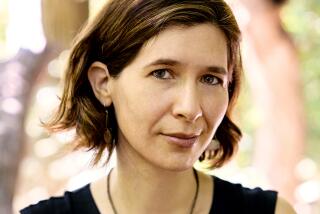Losing her head, losing her heart
- Share via
Maeve Binchy’s career is proof that an internationally bestselling novelist needn’t have the full arsenal of fiction writing skills. What she does need is the shrewdness to stick to her strengths, which in Binchy’s case are sure-handed plotting and a feel for the foibles and dreams of ordinary Irish people.
The heroine of “Quentins,” Ella Brady, is a sensible young Dublin woman who has a blind spot: She doesn’t realize that the married man she loves, Don Richardson, is not only trifling with her affections but defrauding investors, including Ella’s parents, of their savings. When Don flees to Spain, leaving behind a computer with his financial records, Ella doesn’t give it to the police.
Though her friends urge her to do just that, she feels it would be wrong, somehow, to incriminate a man she loved. Besides, Ella feels that Don will want the computer back. He will take risks to get it -- and isn’t that the same, almost, as declaring that he still loves her?
A writer less assured than Binchy wouldn’t let Ella remain deluded so long. She would fear that such a character couldn’t keep our sympathy. But Binchy knows that it’s human to lose our heads along with our hearts and that Ella’s blind spot doesn’t prevent her from being smart and savvy in other contexts.
To help make up for her parents’ losses, Ella takes a job with a fledgling film company that aims to document “the growth in Irish self-confidence” in the last 40 years by focusing on a restaurant, Quentins, which has evolved from a greasy spoon “full of people with suitcases tied with string come in for tea and a couple of fried eggs before they took the emigrant ship” into one of Dublin’s finest eateries.
This allows Binchy to piggyback a number of other stories into the main story of Ella and Don: the story of Quentin, the restaurant’s gentle, reclusive founder; the stories of Patrick and Brenda Brennan, who manage the place; and the stories of waiters, customers and friends. It’s a strategy Binchy used in “Scarlet Feather,” about a couple who started a catering company. In fact, Cathy Scarlet and Tom Feather also appear here, along with characters from “Evening Class” and “Tara Road.”
On behalf of Firefly Films, Ella journeys to New York City to solicit funding for the documentary from the King Foundation, whose director, Derry King, seems like just the man to make her forget all about Don, except that Derry, who had a drunken, abusive Irish father, hates her country. Back in Dublin, Ella discovers that Don’s associates are indeed trying to get in touch with her. And she begins to have second thoughts about the film. Isn’t Quentins too special a place to be exposed to the world’s voyeuristic eyes, even with the best of motives?
Though the stories flow readily, Binchy’s prose has no beauty to it. Her dialogue is uneven. She can’t describe anything so that it takes vivid form in our minds. So she wisely doesn’t try. She minimizes description, like the pale washes in the background of a watercolor.
Nor does Binchy have -- and this is a strange thing to say of an Irish writer -- any interest in politics and history. Hers is a world of work and love alone, in which fulfillment belongs to individuals or small groups of like-minded strivers. It’s an optimistic world: This is surely the secret of its appeal. Honest, cheerful, hard-working people prevail; hypocrites get their comeuppance. Binchy gives us just enough realism to convince us that her characters have paid their dues before she relents and lets the good times roll.
More to Read
Sign up for our Book Club newsletter
Get the latest news, events and more from the Los Angeles Times Book Club, and help us get L.A. reading and talking.
You may occasionally receive promotional content from the Los Angeles Times.







